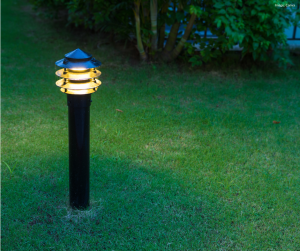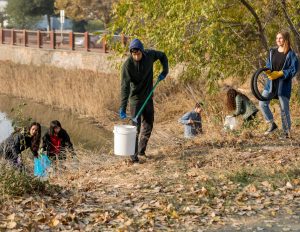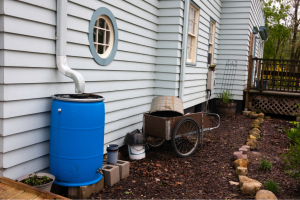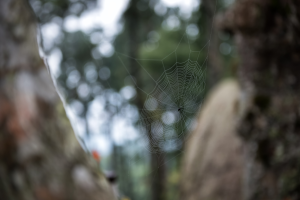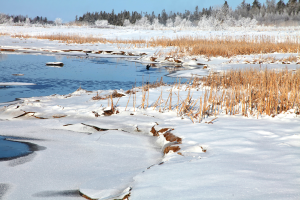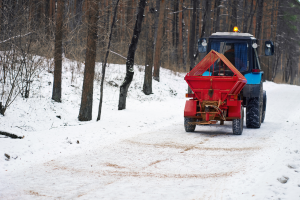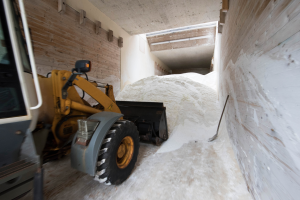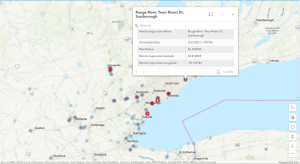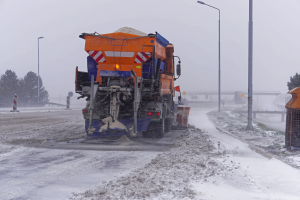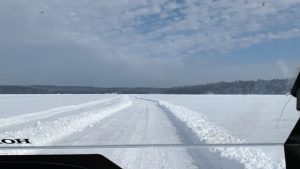by Andres Clavier, Freshwater Stewardship Education Intern Light pollution is becoming an increasing concern for urban and waterfront dwellers, wildlife enthusiasts, astronomers, and eco-conscious individuals. While we all enjoy the conveniences of over-lit streets, properties, and cities, the unintended consequence has been a sky filled with artificial glow that disrupts wildlife and ecosystems. What if we could have illuminated properties and cities without the negative ecological effects? ... Read More
Reclaiming our Refuse: The Power of Community Shoreline Cleanups
by Ty Fischer, Riparian Health Restoration Intern In many ways, the shorelines of our lakes and rivers provide windows into the health of the freshwater systems themselves. For instance, lakes and rivers with dense vegetative buffers on their shorelines are more likely to have better water quality and healthier aquatic plant and animal communities, as opposed to those with barren shorelines that are more likely to suffer from increased toxin and nutrient input from runoff, high sediment ... Read More
Managing Water Runoff
by Samantha Cunningham, Ecological technician Landscaping your property can be as simple or as complex as you need. Landscaping is a diverse science, meaning that there are many different directions you can research, so we are going to focus on the sub-discipline of landscape engineering. For us this entails assessing what the current state of the property is and seeing where we can improve. Today’s target? Managing runoff on shoreline properties. Through this blog we will walk through ... Read More
Watersheds Canada weaves a web on World Water Day
by Monica Seidel, Communications and Fundraising Manager at Watersheds Canada Have you ever had the moment where you are out for a walk and you see the magical glint of a spider’s web? You go out of your way to avoid it, only to find yourself somehow still with a strand attaching itself to you. The spider’s web was much larger than you thought and each string was depending on the others to stay in place. A few weak links, and the spider’s web falls apart…onto your arm. Things within the ... Read More
Can Natural Buffers Help Mitigate Road Salt Pollution?
by Andres Clavier, Freshwater Stewardship Education Intern Road salts, a common winter ally for icy streets, have profound ecological impacts as the melted snow and ice wash these salts away. What role, if any, do natural buffers of vegetation along shorelines provide in protecting waterbodies against this alarming pollution? A natural buffer predominantly comprises vegetation like trees, shrubs, and grasses placed along water body edges. These buffers play a pivotal role in maintaining ... Read More
Are There Alternative Solutions to Road Salts?
by Andres Clavier, Freshwater Stewardship Education Intern In cold climates, icy roads have traditionally been navigable thanks to road salts. As environmental awareness grows, so does the quest for more ecologically kind alternatives. Although a multitude of alternatives have been tested, finding a universally accepted replacement has remained a challenge. In this blog, we will summarize some of the alternatives that are being tested and used around the world, and discuss some of their ... Read More
Best Practices from the ECCC Code of Practice: Aiming for Reduced Salt Pollution
by Andres Clavier, Freshwater Stewardship Education Intern The environmental repercussions of excessive road salt application have instigated numerous research and policy endeavours. One significant contribution in this area is the "Code of Practice for the Environmental Management of Road Salts" developed by Environment and Climate Change Canada (ECCC). This post delineates the salient practices endorsed by this code for salt authorities, emphasizing the reduction of salt-induced ... Read More
How to Identify Salt Vulnerable Areas
by Andres Clavier, Freshwater Stewardship Education Intern With the widespread use of road salts in countries to combat winter's icy conditions, our freshwater ecosystems are increasing in salinity which is hazardous for our ecosystems. This is especially true for salt vulnerable areas. What is a Salt Vulnerable Area? A salt vulnerable area refers to freshwater sources, primarily lakes and rivers, that are particularly susceptible to contamination from road salts (Environment Canada, ... Read More
Are Canada’s lakes becoming salty?
by Andres Clavier, Freshwater Stewardship Education Intern Recent research has highlighted concerning news: there has been a pronounced escalation in the salinization of our freshwater bodies over the past twenty years. If this trend continues, many Canadian lakes will reach critical levels in the next 40 years. Elevated salt concentrations can severely impair aquatic flora, lead to widespread fish deaths, and turn these freshwater zones inhabitable for many species. The implications extend ... Read More
An ice road to Rome: Trout spawning bed restored in Madawaska Valley, Ontario
by Monica Seidel, Communications and Fundraising Manager The saying goes that ‘all roads lead to Rome’. At that point in human history, the city of Rome was a critical centre of activity that all traffic moved to and through. By directing all movement to Rome, it was ensured to be top-of-mind and to keep its relevancy and importance. Today, of course, there are many different “Romes” – things and places that hold our attention and drive our actions. For waterfront property owners, one of ... Read More
- « Previous Page
- 1
- 2
- 3
- 4
- 5
- 6
- …
- 17
- Next Page »

